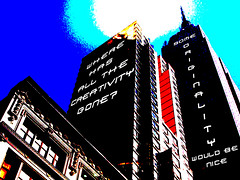 Image by autiscy via Flickr
Image by autiscy via FlickrIt’s an age-old battle between writers and the “experts” – agents, publishers, writing teachers, and so forth. You (the author) have written a story unlike anything that’s ever been published before. It’s going to set the world on fire with its deathless prose, stunning turns of phrase, brand new characters and settings, and brilliant themes. It will blow away agents and publishers. You can’t wait for the bidding war to start.
And then you get your manuscript back with a form rejection letter: “not our market.”
Originality is one of those words that’s hard to define, but (as a Supreme Court justice said about pornography) we know it when we see it.
But how original does a story have to be? Does anything spring whole cloth out of nothing?
Every story has antecedents – ideas, stories, characters, situations that it refers back to and which it was influenced by. Even Harry Potter, that benchmark of children’s literature these days, is basically a story about a kid who becomes a wizard. This concept is not wholly new – J.K. Rowling merely added her spin on it. And this is a good thing. Even if you’ve never heard of Harry Potter before, you probably know what a wizard is, so you have some idea of what Harry’s books are about.
Every story has antecedents – ideas, stories, characters, situations that it refers back to and which it was influenced by. Even Harry Potter, that benchmark of children’s literature these days, is basically a story about a kid who becomes a wizard. This concept is not wholly new – J.K. Rowling merely added her spin on it. And this is a good thing. Even if you’ve never heard of Harry Potter before, you probably know what a wizard is, so you have some idea of what Harry’s books are about.
Growing up, I was a huge fan on the first Star Trek series, which was unlike anything else on TV at the time. But even Star Trek had antecedents. It was a spin on Wagon Train (an earlier TV series about people exploring the Wild West), Horatio Hornblower (a series of books about a 19th century British naval officer), and, well, just about every science fiction series that came before it.
The experts tell you that if you want your book to be published, know what market your book best fits into, understand what readers of those books want, and tailor your work accordingly. And they’re right. Here’s why:
Book publishers publish what they think will sell. Obvious? Yes. But how do publishers arrive at their opinions? They watch what has sold in the past and what is selling now. It’s not an exact science, but trends can provide indicators of what an audience wants. Consider the popularity of vampire novels.
I read a newspaper headline yesterday which asked if Hunger Games was going to knock vampires off their lofty perch. I don’t know (or care) if it will, but the headline illustrates a point. Popularity of a particular type of book plays a key role in determining what publishers will publish.
Human beings like to read what’s familiar. We crave comfort through characters we can identify with, settings we recognize, and situations that are similar to those we’ve experienced. Harry Potter is about a kid going to a new school – everything else springs from this simple and universal concept. Star Trek was about exploring new lands (or worlds) on a ship – a call to adventure that is central to the human spirit.
This does not mean there is no room for originality. But originality works best in small doses, when it adds a fresh ingredient to the stew. Gene Roddenberry may have built on existing works when he created Star Trek, but he also added social themes (unheard of on television at the time), an optimistic future (unusual for the Cold War era), an interracial cast (also new to TV then), and serious, intelligent science fiction stories (going completely against the grain for TV).
And Roddenberry knew what TV viewers wanted (or at least what the experts told him they wanted) – that’s why you see ray guns (phasers), fist fights, and battles with aliens on Star Trek!
So, go ahead. Be original! But know when not to be.




2 comments:
Originality is merely the unique combination of old ideas. The stories that generate the most interest are those with a degree of familiarity with a twist.
Great point, Dave. I didn't even try to define "originality," but you've provided a good definition.
Post a Comment